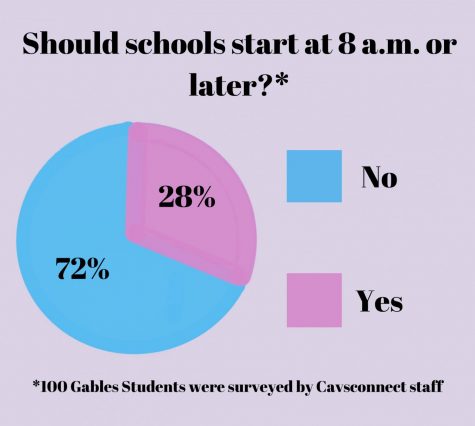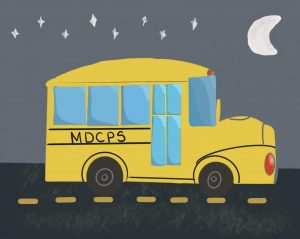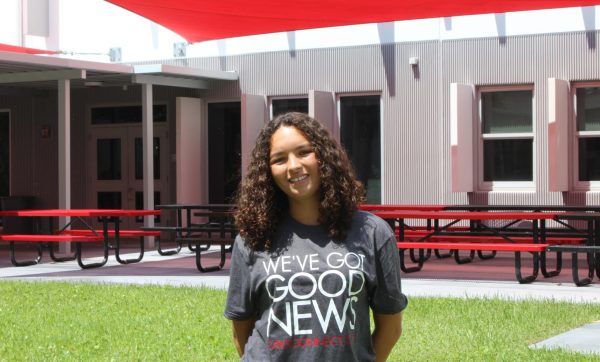A Later Start to School? No, Not the Time
Dec 18, 2019
Last month, on Nov. 20, Superintendent Alberto Carvalho tweeted that the school board is currently discussing starting all schools in Miami-Dade County at 8:00 a.m. or later. This may seem to be a blessing, because who would reject an extra hour of sleep? Well, the issue is not that simple. It has been promoted by Carvalho and the general media as a way to “keep students from riding the bus in the dark”, but that is only one side of it. With this change, students would end school a minimum of one hour later as well.
The entire idea of pushing school times is pointless because students will remain sleep-deprived, potentially to a further extent than ever before. Additionally, after-school activities would perfectly align with the nationally-renowned Miami traffic and the low-income teens in the county supporting their families with their income from working after school could lose an hour of work in their schedule.
“Getting out of school later is not a good idea because I would get home a lot later, giving me less time to do homework and making me go to sleep a lot later, leading to the same amount of sleep I currently get,” sophomore Joaquin Breslin said.
Nationwide, sleep deprivation in teens is a major dilemma. Students in content-heavy courses, such as Advanced Placement courses, can sometimes have about five hours of homework every night. With this massive workload, high school students are getting less sleep than ever before. Along with this workload, the competition of the college entrance process has made it necessary for students to get involved in as many extracurriculars and sports as possible. The “extra hour” would only back up students’ schedules, shifting all of their work an hour or more later. The end of after-school activities would coincide with the traffic rush around 5:00 p.m. Because they know they get to wake up later, students would then misinterpret the extra time as an excuse to go to bed even later than they already do. The later school times would develop even unhealthier habits for students, lasting long into their adulthood.

After surveying 100 students, the Cavalier student body has spoken and it was found that students favored keeping the school times as they currently stand.
Miami-Dade County Public Schools (MDCPS) cannot implement this policy for the sake of the students that work to support their families. About 74% of students currently enrolled in MDCPS schools live in low-income households. Once students reach high school, many are expected to “pull their weight” in their household by earning a part-time wage.
This money can mean a world of difference for the families that live paycheck-to-paycheck, sometimes keeping their families off of the brink of homelessness. With the school times being shifted back an hour, many high school students would not have enough time after school to get to their jobs. For some, this would mean that they would have to quit; others that cannot afford to quit might jeopardize their future careers and stop going to school if their families relied on the money they made with that part-time job. This policy change, to some extent, can be quite frankly considered classist and ignorant, failing to take into account the needs of our low-income community.
“As a Gablette, I leave school late because of practice. If this changed, they would move my practice to end at 8:00 p.m. instead of 7:00 p.m,” sophomore Paulina Texier said.
Many people including Superintendent Carvalho believe that logistically and financially, this change is necessary and in benefit to the county. This is partially true, as less bus drivers would need to be paid to drive in the early hours of the morning. However, by putting this protocol in place, the county is putting the frugality of MDCPS before the needs and well-being of students. The change would cause a major shift in every aspect of their lives, but the officials that are pushing for the change do not understand the gravity of the circumstance. To them, it is just another implementation to look appealing on their resumés or a tactic to add to their political agenda. The “No School Buses Before Dark” idea can impact the lives of all students in the county, but if the school board and superintendent do not pay attention to the opinions of the students themselves, there could be massive repercussions.
On the superficial level, this policy change may appear to be a grand idea. In reality, students will develop even worse sleeping habits and will get home much later because of their after-school activities. Students that rely on part-time jobs after school might not have the chance to earn this money, meaning that more students would drop out of high school to work. If MDCPS really wanted to improve the lives of students and allow them to get more rest as they say they do, they would unify with the state of Florida to reduce the pressure of our state’s standardized tests and end-of-course assessments that only add to our current workloads. Testing and overworking students is at the heart of the issue, but failure to address any of those concerns will leave the county in the same position as it is now.
















Jenni Birkett Pfeiffer • Dec 19, 2019 at 8:22 am
Nice article. Great points. I agree, that the standardized testing and heavy workloads are huge issues. Do you know if there has been a survey sent out by MDPS to students and parents to gather their feedback?
CGHS alumni c/o ’90
Jenni